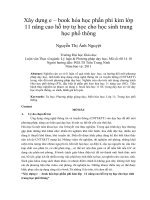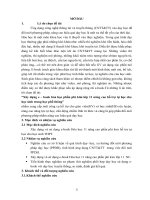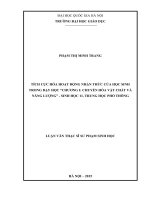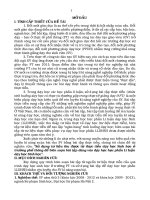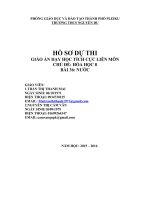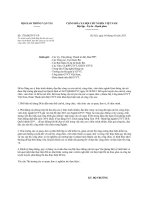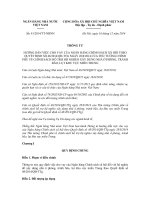2 bài luận về trách nhiệm đạo đức của 1 người hướng tới nhân viên của họ
Bạn đang xem bản rút gọn của tài liệu. Xem và tải ngay bản đầy đủ của tài liệu tại đây (630.89 KB, 52 trang )
ETHICS AT WORK:
TWO ESSAYS ON THE FIRM’S MORAL RESPONSIBLITIES
TOWARDS ITS EMPLOYEES
Dan Munter
Stockholm, Sweden 2013
Licentiate Thesis in Philosophy
Abstract
Munter, D., 2013. Ethics at work: Two essays on the firm’s moral responsibilities towards
its employees. Licentiate thesis in Philosophy from the Royal Institute of Technology 44. 85 + x pp.
Stockholm. ISBN: 978-91-7501-872-0
The overall aim of this thesis is to investigate the firm’s moral responsibilities to its employees.
This is done in two particular contexts and by asking two questions: First, how should management design the firm’s code of ethics so that it does not risk harming the employees or
generating legitimate complaints? Second, what kind of demands or working conditions is it
morally justified to offer employees in the contract situation? The ethical frameworks in the
two essays overlap, not least in spirit, but are not identical.
Essay I analyses a sample of corporate codes in the Swedish banking sector. The purpose is to
investigate the codes’ ethical status. Are they consistent with the values of fairness or are they
instead at a risk of harming the employees? With regard to employees, eight of the nine codes
in the material were found to (a) focus one-sidedly on their duties and responsibilities, (b) lack
statements regarding their value to the firm, while carefully stating the importance of several
other stakeholders, (c) have an anonymous or authoritarian tone, (d) say little regarding the
substantial reasons why certain behaviour is forbidden or expected; some of the codes also
(e) contained problematic freedom restrictions. The empirical investigation of code content
and design leads us to the normative issue of whether such a design can be unfair and risks
harming the employees. Departing from the values of equality, reciprocity, care and respect,
eight of the nine codes are found to be at risk of being in conflict with these values. The socially responsible firm, which avoids risking employees’ welfare and self-respect, must consider
rewriting such corporate codes.
Essay II seeks to provide a richer moral assessment of the transactions, offers and working
conditions in the labour market. Some of the most influential accounts have focused on either
the act of consent (Nozick), the background conditions (Peter) or the quality of the offers
(Olsaretti). I argue that all these aspects are ethically relevant and necessary to make agreements morally justified. This leads me to the conclusion that (a) unreasonable offers remain
ethically flawed regardless of employees’ consent and adequate background conditions; (b) the
mere act of consent is, nonetheless, ethically valuable; (c) there exist different kinds of demands, affected differently by whether they are properly consented to. Then, in a well-ordered
liberal democracy (which constitute the necessary background conditions), to ascertain
whether a firm’s offers and working conditions are morally sound, we need to know both their
quality (how reasonable they are) and whether they have been properly consented to. A firm
ends up with three moral responsibilities: (i) not to exploit the workers’ disadvantaged position
in the labour market, which requires that they are offered only reasonable proposals, (ii) to
inform employees in the contract situation of all the relevant aspects and working conditions
associated with the job, thereby enabling proper consent, and (iii) once the worker is employed, to only implement working conditions of the kind that are possible to justify and consistent with treating the employees as persons.
Keywords: ethics, work, employees, contracts, consent, offers, labour market, working conditions, fairness, exploitation, reasonableness, wrong, harm, codes of ethics.
Dan Munter, Division of Philosophy, Department of Philosophy and History, Royal Institute of Technology (KTH) SE-100 44 Stockholm, Sweden
This licentiate thesis includes an introduction and the following essays:
I.
Munter, Dan, 2013. “Codes of Ethics in the Light of Fairness and
Harm”, Business Ethics: A European Review, vol. 22, 2. Reprinted with kind
permission from John Wiley and Sons.
II.
Munter, Dan, “Beyond Coercion: Moral Assessment in the Labour Market,” submitted manuscript.
ISSN 1650-8831
ISBN 978-91-7501-872-0
© 2013 Dan Munter 2013
Printed by US-AB, Stockholm, Sweden 2013.
CONTENTS
Acknowledgements
Introduction
Notes on Essay I
Notes on Essay II
Appendix
Essays
I
Codes of Ethics in light of fairness and harm
1 Introduction
2 Previous research and the contributions of the present study
3 Method
4 Results
5 Ethical framework
6 Ethical Inquiry
7 Concluding remarks
II
Beyond coercion: Moral assessment in the labour market
1 Introduction
2 Two competing accounts
3 Consent in different contexts: the flea market and the labour market
4 Substantial justification: what we hold dear
5 Moral assessment in the labour market
6 The nitty-gritty details of moral assessment
7 Concluding remarks
Appendix: The three different kinds of moral assessment
Till Kata
Acknowledgements
This is like the Oscars but where no music stops you from rambling. First, I am
much grateful to my supervisors. Sven Ove has done a fantastic job of building this
institution from ground up. Apart from the many readings of my papers, Sven Ove is
one of those philosophers who do not use his talents to arrogantly bulldoze others.
In my opinion, this virtue is a necessary part of being an excellent philosopher. Lars, I
could have taken you for a Kantian, the way you have tackled your supervising duties.
Despite working 70-hour weeks in a distant province, reading tons of books, having
three kids and constantly tweeting about music, politics and philosophy, you have
managed to be a fantastic supervisor. I would also like to thank Barbro, Linda, Patrik,
Sara, and William for insightful comments and the many thorough readings of my
papers and ‘kappa’, as well as those who contributed at the philosophy seminars. Jesper, I am so grateful for all your help those last days before printing.
The upshot with not being the go-getter type of PhD student is that I have
made many good friends over the past years. I vividly remember the Ugglan sessions
with Anna, Kalle and Madeleine; the heated PhD student meetings; the countless
times standing for too long in the doorway to Sara’s and Anna’s room; the disputes
with Lars about how to interpret Rawls; the permanent chess game with Kalle; all the
fun with Linda, Marlene and Linda. These last years, I have had the privilege to be
Linda’s roommate, who has the best mix of cynicism and consideration. The ongoing
discussion with Patrik and William about … everything, I would not trade for anything. Lotta has had her fair share of stories about what any of these two guys did just
say or do. I guess she is fairly fed-up with hearing about them by now. I however,
hope to have made two friends for life.
Lotta, we are both pleased that I do not have to thank you for bearing with all
my late work or for all those times where you alone took care of our children. But
these last few weeks, when I actually needed to work a lot, you have been great. By
the way, that goes for just about everything. Also, I could not have met anyone with
better parents, who I love hanging out with, drinking whiskey and playing cards.
Talking of good mixes, my mother and father were one such good mix, with
the biggest contrasts. The total relaxation of demands from one of them, while the
other urged me to listen to P1 and to read the newspaper, and who also introduced
me to the ‘veil of ignorance’ – an expression that had an enchanting ring to it, also at
the age of 12. Thank you for that mix! I love you both very much.
1. Introduction
Assumptions, perspectives and methods
The overall aim of the two essays is to investigate some of the moral responsibilities
of the firm to its employees. In other words, how should the firm treat this group to
ensure it avoids justified blame? I ask two questions, one in each essay, respectively:
First, how should management design the firm’s code of ethics so that it does not
risk harming the employees? Second, what kind of demands or working conditions is
a firm morally justified to offer employees? The answer to the first question depends
on how we define fairness, harm and when we consider the employees to have legitimate complaints on such a code. For the code to meet ethical requirements, it
needs to avoid harmful practices (defined as unfair setbacks). Fairness is understood
to incorporate the values of respect, equality, care and reciprocity, which are also contextually defined. The answer to the question in Essay II depends on fairly similar
circumstances. According to this framework, the offers and working conditions must
be consistent with the firm as a moral community, that is, one where employees experience being treated as persons rather than tools. In addition, we must consider the
workers’ situation in the labour market, the contract situation, the role of consent and
what moral responsibilities we can reasonably put on a firm in a competitive market
economy.
This thesis contains two stories of what makes corporate actions morally worrying.
Essay I focuses on harm, fairness, legitimate complaints and employees’ reasonable
reactions. Essay II frames ethics in terms of moral responsibility, consent, exploitation and different kinds of wrongdoing. One reason for this difference is that Essay I
focuses more on employees and their reasonable expectations, while Essay II investigates the firm’s moral responsibilities in a more abstract manner. Nonetheless, there
is a common theme or perspective; the assumed importance of employees’ wellbeing.
The consequence is that both frameworks set out to track poor treatments that give
rise to justified indignation among employees and the surrounding society. I assume
we should aim for a firm where all parties are fairly content with the distribution of
burdens and benefits. We should then ask, which kind of codes, offers and working
1
conditions will be regarded reasonable and justified in such a context and which will
be met by justified resentment.
If trying, somewhat loosely, to describe the kind of work-life I find attractive, it could
go like this: work should not harm us physically or psychologically, nor expose us to
risks or degrading tasks. It must be possible to live decently on one’s salary, and the
firm ought to design the workplace so that complaints and suggestions can be discussed jointly and on equal terms with management. The distribution of burdens and
benefits should be in harmony with some fair and predictable principal, which employees are able to accept or even embrace. Even if a principle of meritocracy governs certain aspects of the firm, the distribution of respect, consideration and reciprocity must never be affected; instead, such social goods should be distributed equally
to all those who contribute, regardless of their talents and abilities. However, the firm
operates in a competitive market economy. This aspect must be acknowledged to
avoid demanding too much of the firm. In the light of this, all policies affecting employees should be justifiable to them, and they should accept no less than reasonable
treatment.
The function of this introduction is multiple: to elaborate on certain methodological
aspects, to set the scene and provide context, to recap some adjacent discussions and
to add some perspectives that I did not include in the research articles. I also discuss
some of the premises of the two essays; occasionally justifying my choices, at other
times finding reason to doubt them. As I have a curiosity for the process itself, how
to find a reliable ethical criterion, able to assign blame and indicating the right course
of action, this will be one theme in this introduction. My hope is also that the parties
in the firm – e.g. unions, managements and owners – will appreciate the following
discussion and that this thesis can contribute by indicating some ethically relevant
aspects of work. Pushing things forward, as the song goes.
I begin by explaining why I have chosen not to use any of the classical frameworks in
ethical and political theory. Thereafter, I elaborate on some methodological concerns
that must be taken into account when designing ethical tools and criteria for wrongness. The frameworks in the two essays will hopefully find support in the essays
themselves; thus, the following methodological discussion attempts to widen the perspective rather than recapping these accounts.
2
The insufficiency of some well-established normative theories
There are several tools for ethical investigation that establish a criterion for rightness.
Some refer to Immanuel Kant’s categorical imperative (Arnold and Bowie 2003,
Werhane 1985). Others prefer to frame ethics in terms of maximizing utility (Tännsjö,
1995) or to focus on flourishing and virtue (Shiffrin 2007, Solomon 2004). Still others
depart from a libertarian perspective (Friedman 1982, Nozick 1974) or apply a Marxist-inspired framework (Cohen 1985, Zimmerman 1981). The list is far from exhaustive, but includes several of the most widespread normative theories.
All these theories have merits and I sympathize with all of them in certain respects.
My intention here is only to say something about why they will not (regardless of
their other insights and strengths) be part of the criteria of moral rightness in this thesis; not saying that it would have been impossible, but rather trying to explain why I
have not felt drawn to any of them.
Utilitarianism (being the most widespread consequentialist theory) must be employed
with caution.1 The following characteristics, taken together, make it somewhat complicated to use utilitarianism as the appropriate criterion for justified corporate behaviour: (a) According to utilitarianism, what is the right thing to do will always, ultimately, be an empirical question. Thus, to breach a contract or refrain from fulfilling
obligations does not have a distinct disvalue in itself. This is dissatisfying in a context
where agreements and predictability play a central role. (b) In the context of work,
most of us are rightly interested in other values than utility, such as obligations, moral
responsibilities, rights and duties, converted into a set of fair and predictable rules
that should govern a reciprocal employer-employee relationship. However, the consequentialist typically asks of us to be agent-neutral. Is this desirable (or even possible)
in a complex web of very particular obligations, rights and responsibilities? (c) How
do we measure utility? How would the consequentialist evaluate a situation where the
shareholders gain much by an unreasonable demand on behalf of the employees, and
how much should we rely on such an ethical evaluation? If management, for example,
enjoys a luxurious lifestyle at the expense of the employees’ wages, this might come
out just fine in a utility calculation, or would profit rise due to a humiliating dress
code, the utilitarian will have to take also such utility into consideration. However, a
As is well known, there are many versions of consequentialism. For example, pluralistic or ideal
versions would allow us to take many values into account or assign intrinsic value to friendship,
freedom or beauty. For an introduction to utilitarianism see Kymlicka (1990)
1
3
consequentialist framework can also generate very different recommendations. Since
money tends to work better if distributed to those who have little, maybe management or the owners are blameworthy if they are not giving the surplus away to those
who need it more. Thus, to maximize utility is too often either repugnant or supererogatory, and those aiming for predictability and legitimacy will not be attracted to
such a criterion for rightness.
Turning instead to Immanuel Kant (2012), in his framework empirical circumstances
and context become irrelevant to moral assessment. This differs much from the
method used here, since I consider the context of market economy and the preferences and experiences of the workers. So, where I hope to construct a basis for a
reasonably fair and trust-generating firm that does not harm its employees, Kant’s
objective is to identify universally valid principles of duty. Further on, as he puts focus on the pure intention of an act and disregards the importance of its consequences,
I argue that the negative consequences of the firm’s treatments are crucial, while the
actors’ intention is ethically irrelevant. Maybe one can describe the difference between the two perspectives (Kant’s and mine) as the one between a natural scientist
and an engineer. The letter uses some of the truth-seeking theories from natural science but with the purpose to design artefacts that are functional rather than true. So
then, the purpose of this thesis is to construct tools that are capable of assigning
blame and moral responsibility and also to indicate treatments that should possibly be
mitigated, but not to seek the truth. This is not to say that we cannot be inspired by
some of Kant’s insights, even if one might want to liberate them from some of the
Kantian metaphysics. One example is the idea that no one should be treated only as a
means, a notion that I employ in the second paper.
What about the libertarian notion of rights, that is, the right of two informed adults
to consent to whatever legal and non-coercive agreements they wish and, consequently, the right for the firm’s owners to design whatever sort of legal business they
prefer? (Friedman 1982, Nozick 1974). Such rights are fundamental, but not the issue
here. Rather, what I investigate is when employees are treated poorly and therefore
have legitimate complaints, which is a different question than what adults should be
permitted to consent to. While I ask how we should treat each other to be decent
persons, the libertarian typically asks whether the state should intervene and prevent
such treatments. Further, as fairness and decency are not the only considerations,
some of the treatments that I deem morally worrying should perhaps, on balance, be
4
permitted since they generate other types of benefits or values. When the libertarian
restricts her theory to only regard what adults should be permitted to do (saying less
about the ethical status of these agreements), our accounts can be consistent. That is,
I can argue that a policy X is indecent and ethically flawed, while the libertarian can
argue that (even if X is flawed) it should nonetheless be allowed due to the overriding
considerations of liberty.
I turn now to the antipode of libertarianism, Marxism. A Marxist typically investigates
the structures of capitalism and evaluates the inherent characteristics of market economy (cf. Kymlicka 1990). I however do not assume that transactions in the labour
market are exploitive, wrongful or coercive per se. Such an assumption sweeps too
many transactions with it and also labels morally justified agreements as wrongs.
Therefore, a Marxist framework will not be the optimal tracker of relevant wrongs.
Moreover, it remains an open question whether Marx analyzed capitalist transactions
from an ethical viewpoint (Cohen 2001), which is the overriding concern this thesis.
However, since I am concerned primarily with the welfare and interests of disadvantaged workers, I will be worried by similar working conditions that a Marxist will find
objectionable.
Finally, virtue ethics typically focuses on questions regarding human character. Therefore, it directs its searchlight towards something other than the ethics of actions.
However, I am indifferent to whether management has truly incorporated the values
I promote. If those running the firm are in much inner conflict regarding these matters, forcing themselves to do the right thing, it would not affect the ethical analysis
of their actions (Hursthouse 2012). In addition, when I frame ethics in terms of exploitation, moral responsibility, reasonableness and legitimate complaints, I therein
ascribe value to other concepts than those associated with a virtue ethics approach.
Had the analysis been conducted by a virtue ethicist, the question would have been
how management can enable them to flourish, which I assume supererogatory rather
than a ground for tracking wrongdoing.
I am rather sympathetic with Feinberg’s (1984) methodological approach; however, I
have not been able to apply it (stumbling over these passages too late). Feinberg expresses scepticism regarding using deep structure theories, such as utilitarianism and
Kantianism. Instead of being absorbed by any such theory, Feinberg
5
appeal[s] at various places, quite unselfconsciously, to the kinds of reasons normally produced in practical discourse, from efficiency and utility to fairness, coherence, and human rights. My omission is not due to
any principled objections to ‘deep structure’ theories (although I must
confess to some sceptical inclinations). I do not believe that such an
approach is precluded, but only that it is unnecessary. (p. 18)
Feinberg proposes another method, where he appeals directly to the reader, hoping
to propose an alternative account that fits even better with her underlying convictions.
The method requires a certain degree of common ground, but Feinberg hopes that
the unconvinced reader will discover some unnoticed ‘costs’ with clinging on to her
position, and also that ‘the “already convinced” may find a useful framework of reasons to render more clear and secure their prior convictions […]’ (p. 19)
My point has not been that these theories or their advocates have made any particular
errors, but rather that these tools are not optimal for the present context or purposes.
Some of them I would regard much helpful in other contexts, albeit not the one here.
For example, virtue ethics certainly carries many insights for how to become a wiser
and more content person, while utilitarianism might be the best tool to direct foreign
aid.
Designing ethical tools: some pitfalls and possibilities
Having attempted to make sense of the choice to not side with any particular normative theory, I now move on and elaborate on what to consider and what pitfalls to
avoid when designing ethical tools. As the following discussion operates on a more
general and elaborate level than the two essays, there will be less of an elegant connection between the frameworks in the essays and the discussion that now follows.
The intention is not primarily to justify the essays, but rather to complicate things and
reveal some of those assumptions and notions that have possibly had an impact on
my choices.
To make standard top management decisions, knowledge regarding such issues as
logistics, customer preferences and advertising is crucial. To produce well-informed
decisions, the management also must know which ethical values and costs it has to
account for, what is ethically problematic, what is admissible and what to strive for.
Some such values and costs concern employees, where certain treatments are desir-
6
able and others are flawed. To design an appealing ethical framework, it is important
to identify appropriate normative concepts and investigate their precise meaning in
the context at hand.2 The question is where to place the ethical bar; avoiding both to
demand too much by labelling fair acts as wrongs and neither doing the reverse mistake by labelling wrongful acts fair.
To ascribe a moral carte blanche to all corporate behaviour consistent with the law
would be an ill-chosen strategy for me, since I make inquiries into what treatments
are of such poor quality that the firm should consider terminating them, the employees should protest and the legislators should reconsider their legality. Thus, the intention is not to investigate what the firm could get away with. Rather, I am curious to
identify what kind of corporate behaviour generates justified approval and genuine
consent of the employees, however without demanding too much of the firm.
Moving on, what does it mean to demand too much of the firm? With regard to the
context of this thesis, it is to stipulate a criterion for wrongness where employees too
easily have justified complaints regarding their firm’s (seemingly reasonable) treatment. If one chooses excessively controversial or out-of-context theories regarding
the firm’s moral responsibilities, one is at risk of not contributing to the context that
one hopefully wants to shed some light upon, thereby making one’s contribution irrelevant or obscure. To avoid this, we could formulate a rule of thumb for which
types of theories could be adopted: they should typically be such that they can be
acknowledged both by the enlightened employer (even if not, ultimately, acted upon)
and by the employees (having only reasonable expectations). If the employer cannot
grasp the criterion for wrongdoing, this is an indication that one should modify one’s
theory; it might need a more suitable criterion of wrongness.
The ethical framework must be able to distinguish between those treatments that are
fair enough and those that constitute wrongdoing. That is, we need a tool with normative precision, not sweeping too many treatments with it, while (simultaneously)
not letting flawed treatments off the hook. For this reason, I must say something
regarding the difficult task of assigning justified blame when the firm actually follows
Some have called for better ethical tools to evaluate the firm’s practices and treatments. For example, Fortin and Fellenz (2008, p. 416) claim, ‘The unfolding of justice or injustice in organizations
remains largely a black box.’ Winstanley et al. (1996, p. 192) called for ‘standards against which existing practices can be judged and new ones formulated’, while Greenwood (2002, p. 265) argues
that ethical theory is rarely used in the discussion of HRM: ‘Questions such as “is this right or
wrong” or “how should management behave” do not seem to be addressed by HRM researchers.’
2
7
the laws of a well-functioning democratic country. The type of society I have in mind
when fleshing out an account of ethics in the firm, is the typical western democracy.
To be regarded as a country of appropriate democratic standard, a certain level of
non-arbitrariness, efficiency and transparency is required, that is, a certain standard
with regard to the democratic virtues. This quality is believed to generate a corresponding level of well-earned legitimacy among its citizens, even when policy fails to
be in harmony with our ethical criterion. In such a democracy, purchases of labour
power will not be assumed wrong nor morally justified per se. A closer investigation is
required to describe the ethical status and ascertain what the appropriate response of
the society and its citizens should be.3 Nevertheless, how should such an investigation be conducted, and what circumstances do we need to account for when assigning blame?
If a legislator in such a democratic society designs a market economy giving great
freedom to firms and entrepreneurs to maximize values such as growth or full employment, how does this affect the ethical evaluation of the corporate sphere? On the
one hand, even if the firm is given this wiggle room, it might still act in conflict with
the employees’ reasonable expectations and our criterion for rightness. A poor treatment, such as dangerous work tasks or very low salaries, can attract justified blame
and resentment, despite such treatment being in harmony with a legislation generating other goods. If this is a fair description, the firm could be asked to refrain from
the opportunity that the government has given it, and instead promote the values of
ethics and the reasonable interests of its employees. Consequently, if the government
permits firms to pay very low wages (otherwise they move their businesses to lowwage countries), firms should avoid exploiting this opportunity to the fullest and
some firms who utilize this opportunity may be blameworthy.
On the other hand, the citizens of a well-functioning democracy have jointly (at least
in some minimal sense) decided on the boundaries within which firms should be allowed to act freely.4 Take again the example with minimum wages. If a firm pays a
Several countries will end up in the grey area, where it is uncertain whether the principles are applicable to firms operating within those countries. For example, is India or South Africa transparent
and sufficiently well-functioning to generate the kind of legitimacy that I assume is generated by, for
example, German institutions?
4 It is important to bear in mind that the law does not regulate all kinds of corporate behaviours.
Therefore, treatments, agreements and acts that fly under the policymakers’ radar (e.g. adopting a
disrespectful corporate code) cannot lean on this kind of legitimacy as easily. Thus, it is then more
3
8
minimum wage and the wage level is the result of political deliberation and public
debate, this process is ethically relevant and appears to enhance the ethical status of
also very low wages. This cannot be ethically irrelevant. One way to describe the relevance is to say that such poor wages, nonetheless, are procedurally justified and therefore legitimate. Taking a step back, it is evident that we are confronted with a delicate
situation (relevant for the enquiry in my second essay). I have presented two ethical
descriptions of a firm offering minimum wages; one where the firm’s low wages attract justified blame and another where being an opportunist and paying poor wages
is legitimate. To label corporate treatments seems to be a truly difficult task in a wellordered democracy.
To sort this out, it may be helpful to distinguish between different kinds of wrongdoing, based on the difficulty and urgency to do the right thing. It is possible that to act
in harmony with our ethical framework is occasionally morally mandatory (and
blameworthy if we fail); while at other times it is unwarranted to blame those who fail
due to the difficulty associated with such an action. We could relate this notion to the
Kantian assertion that a morally guiding ‘ought’ needs a plausible can (cf. Stern, 2004).
In Kant’s version, the can is of the kind where an action must be only logically possible to perform to be mandatory. According to Calder (2005), even if we cannot derive the notion of degrees of wrongdoing from his framework, Kant acknowledged ‘that
the easier it is to do what is right or the stronger are the grounds to do our duty, the
more we should be blamed if we fail to live up to our obligation’ (p. 230). Instead, I
take the following tentative position: if doing the right thing is associated with high
risks or costs (taking a bullet for an unknown child or to donate a very large part of
my salary to charity), we should be less inclined to condemn or blame this inability to
act in accordance with our framework. However, if doing what is right is easy or very
urgent, blame will be an appropriate response since it is a more severe kind of
wrongdoing, less easy to forgive.
If again transferring this notion to the labour market, when is it fair to say that a firm
can abstain from certain kinds of legal but ethically worrying treatments, such as offering workers unreasonably low wages or exposing them to certain kinds of risks? Is
there, for example, such a can if the consequence of raising wages is an overriding risk
for bankruptcy? To blame the firm’s owners for not risking the firm’s existence (or
difficult to argue that, since the citizens have not disallowed this treatment, it has thereby been
deemed justified and sufficiently fair.
9
giving all surpluses to charity) appears to be a case of demanding too much. A plausible can is not in place and such acts would be supererogatory or foolish rather than
deserving blame if not performed. 5 A distinction between degrees of wrongdoing
might be fruitful: If arguing that a firm both can and ought to refrain from a certain
morally worrying treatment, then such a treatment, once performed against the employees, can be labelled ‘blameworthy’ wrongdoing. In cases when the necessary can is
not in place, but the treatment continues to be in conflict with our criterion for rightness, then such a treatment can be labelled as ‘admissible’ (or permissible) wrongdoing. Our impulse to condemn the firm should then be eased and in the case of admissible, but wrongful, minimum wages, we might instead urge legislators to consider
raising such minimum wages.
If one decides (as I do) to let such wrongdoing off the hook by ascribing to it certain
admissibility, one must bite the bullet and allow for ethically flawed acts to escape
blame. If we assume that well-functioning democracies are vaccines against repugnant
corporate behaviour, this seems plausible. However, otherwise we are forced to regard certain repugnant treatments as non-blameworthy, which might make such a
position less attractive.6 The difficulty of detecting what kind of can we are dealing
with is the reason why I use the terms ‘attracts blame’ and ‘morally worrying’ in Essay
II. It is a way of saying ‘from the perspective of ethics, we have a problem; however
unclear or how big a problem it is and whether we should assign blame’.7
To summarize, when designing a framework thought to track wrongdoing, we need
to be careful not to demand too much of the firm. Demanding too much could lead
to the construction of a framework that sweeps too many treatments with it by labelling sufficiently fair treatments as wrongs. Another way to demand too much is to
blame the firm in cases where the firm’s treatment is admissible and can be excused
With regard to first article on corporate codes, there will be no threatening bankruptcies or structural excuses to write a demeaning or disrespectful code of ethics. Thus, the can will not stand in the
way of the occurrence of an emerging ought.
6 It seems plausible that the majority of the citizens of a country share a repugnant preference and
vote for it. However, if we add the condition that a democracy is also fair, this might raise the bar so
that this also places some requirements on content, that is, what kind of laws is implemented. Maybe, for example, such a fair democracy has a constitution restraining the citizens’ possibilities to
vote for certain types of repugnant laws (e.g. such that discriminate or obviously harm the citizens).
But then we would be limiting the number of countries that will live up to this higher standard.
7 This taxonomy sums up some of my ideas on different kinds of wrongdoing: (a) X is a blameworthy if the firm can easily refrain from X or X’s consequences are very bad; (b) X is permissible if
refraining from X is very difficult and X is not so bad for the employees; (c) X is legitimate if X is
consistent with the laws of a well-ordered democracy. This is however just a tentative sketch.
5
10
and explained in other terms than greed. Moreover, if the enlightened employer does
not at all grasp the ethical criterion and express disbelief, this is an indication that it
needs to be rebuilt. One method to avoid these pitfalls is to construct a framework
that is context-sensitive and takes into account how difficult it is to do the right thing.
I now continue this investigation by discussing how to use moral language.
Using moral language
If a firm demeans or exploits the employees, such treatments are typically wrongful.
A demeaning mode of communication might be blameworthy due to the relative ease
to terminate such a practice, while exploitive wages are admissible if the reverse condition holds. This would possibly make it mandatory to change the management’s
means of communication, but supererogatory to give a raise. 8 But, there are also
other moral concepts and words that we need to get right. If the action has certain
features, it might be an exploitative kind of wrong; if it includes others, what makes it
wrong might be that it is deceptive, illegitimate or coercive. To properly define these
nuances and use them to tag human interaction is a good way to conduct normative
research.
In my view, when conducting an ethical investigation, we should avoid using moral
concepts in contradiction (a) to how they are typically used in ordinary language and
(b) to how most of us typically make moral assessment. This should not be interpreted as that all truth in ethical theory is uncovered and that it is futile to identify
new ethical positions. Rather, my point is that philosophers should not typically utter
‘B wrongs A by doing Y’, if the proposition does not imply that A has legitimate
complaints, Y attracts blame and B should, if possible, abstain from Y. If this is not
the case, we should probably use some other moral concept than ‘wrong’ that more
accurately mirrors what has just happened. For example, it would be confusing to say
that Patrik wrongs the five misfortunate persons in a scenario where he can either
save ten people in one sinking ship or five in another ship, where saving the ten is, de
facto, regarded as the right, albeit difficult, choice. For similar reasons, we should
avoid using words such as ‘violation’ or ‘harm’ if they are not intended to imply that
someone has, without justified reasons, violated your rights or caused you an unfair
setback. The reason is that these words (wrong, violation, harm) connote that we
8
Cf. Feinberg, 1961 with regard to supererogation.
11
have justified reasons to mitigate that kind of action and that someone has probably
acted outside of her rights.9
Moving on to the second instance of problematic uses of moral concepts, is it unfortunate to say that B, by lying to a murderer with regard to the whereabouts of her
hunted victim, has acted in conflict with the moral law (cf. Kant 1949), as it would be
to blame the father for not leaving his family to save needy children in distant countries (a possible implication of utilitarianism). Here, the problem lies not in any obscurity in language but in the application of an ethical criterion, unable to detect relevant wrongs, therein also unable to produce normative insights with regard to
wrongness and when to pass moralizing judgements and resentment.
Certain kinds of behaviours are blameworthy and should be forbidden; others
praiseworthy but not mandatory, or admissible but not admirable. Later, some will
argue that voluntary agreements can also constitute wrongs, just as regrettable and
unfair offers can be morally permissible. At the end of the day, it is such expressions
that normative ethics should help us to get right. A stringent usage enhances our ability to condemn, promote, blame, celebrate, forbid, tolerate and mitigate, thereby
pushing society into a wiser state of affairs. It is therefore paramount to choose ethical criteria with the capacity to convincingly separate blameworthy acts from those
that are admissible or even justified. If a treatment or behaviour is inconsistent with
my criterion for rightness, but does not – in context and outside of discourse – seem
morally worrying, nor do I see any reason for mitigation; what then would the purpose be with my ethical theory? What is it designed to explain or reveal?
Having discussed some methodological considerations when designing an ethical
framework, I move on to elaborate on one of the key concepts in the two essays, the
idea that the firm’s actions should be measured against what is reasonable. Given the
previous discussion, one hope is that this criterion for avoiding resentment will succeed to convince the reader that, when finding behaviour in conflict with it, we
should be inclined to blame those responsible and investigate what measures can be
taken to stop or mitigate such behaviour (even if, ultimately, realizing it is a necessary
evil that generates other goods). However, I have no intention to give a full-blown
However, these are very sketchy thoughts that have not endured any kind of opposition, opening
for the possibility that they are either trivial, false or part of a well-acknowledged theory that I am
embarrassingly unaware of.
9
12
account of reasonableness, far from it. I will merely touch on some traits of the concept that I find attractive and briefly elaborate on its function in Essay I.10
Reasonableness, harm and legitimate complaints
Most agree that we have more responsibilities to our family than to a stranger, other
duties towards our employer than to a neighbour, different loyalties to colleagues
than to dear friends, more obligations to those who always help us than to those who
never help out and so forth.11 In other words, we owe different things to different
persons in different situations. Therefore, what people can reasonably expect from us
will differ. If you are interested in these kinds of notions, then a concept like ‘reasonableness’ seems plausible. It has an elastic and context-sensitive quality, where different contexts and relations bring with them different responsibilities, obligations and
duties. According to Scanlon (1998), relating the concept of reasonableness to rational justification is a possible method of constructing a criterion for wrongness. We
might also extend such a framework by using an additional concept, that of legitimate
or reasonable complaints, where: a complaint is legitimate if a treatment lacks adequate justification. Thus, when the management is unable to justify a policy to the
employees it is not that their complaints stem from being overly sensitive or having
too high expectations.
What then, should be regarded a legitimate ground for complaints in a community
with moral ties binding the parties together and generating warranted expectations?
What treatments should be regarded unreasonable and lacking adequate justification?
To put it differently, what kind of moral responsibilities should we ascribe to the firm
and its management within such a community? I think Greenwood (2002) is right
when arguing that to demand the corporate sphere to ‘do good’ is less reasonable
than to demand a mitigation of harm. 12 To investigate the firm’s treatment from the
perspective of harm is different from Cornelius et al. (2008) and Kjonstad and WillI fear that the concept – as it now stands in the two essays – is underdeveloped. However, I think
the concept has much going for it and it would be an interesting task to more thoroughly develop
and apply this concept in the firm, and to thereby make it at better tracker of wrongdoing. As it
now stands, it appeals to our intuitions rather than guiding us out of the fog. It would have been
natural to apply or develop a Scanlonian (1998) framework in any of the two essays, but I felt that it
would require a too extensive investigation and therefore left this (hopefully) for future work.
11 With regard to special obligations, cf. Honohan (2001) and Arneson (2003)
12 Of course, it does not follow that the firm should not strive towards establishing a workplace
characterized by autonomy, meaningful work tasks and flourishing employees, as long as this is
consistent with running a reasonably efficient firm.
10
13
mot (1995), who investigate how employees can flourish, develop and remain fully
autonomous. In my framework, to not be able to flourish or remain autonomous is
not to be harmed or wronged. To demand this is typically not reasonable, but instead
to demand too much and a lack of these qualities will therefore not constitute legitimate ground for employee complaints. In light of the previous discussion on pitfalls,
to use ‘flourishing’ as a criterion for rightness would strike the employer as rather
strange.
If employees are treated poorly or worse than they deserve, they will naturally have
legitimate complaints. They will resent such wrongful treatment and perceive management with warranted distrust. However, as said before, if an inappropriate ethical
yardstick is used that demands too much, this is indicated by the suspicion that the
employees did not really have any legitimate complaints against the treatment that our
theory identified as morally worrying. This might be the case if using flourishing and
autonomy as criteria for moral rightness. I suspect that a firm that omits providing
these qualities does not cause employees to have such legitimate complaints.
However, why then, should not the employees expect to flourish, have meaningful
work tasks or remain autonomous? Why is it not considered harmful or unjustified to
not be able to flourish (it is definitely a setback for the employees), but unreasonable
to be disrespected or demeaned? Part of the answer might be that many kinds of
work tasks are dull and monotonous by their very nature. To regard such conditions
as indications of wrongdoing would be to neglect one basic idea of what the employees owe to the firm: to be available to management during working hours and, typically, to do what the manager tells you to do in a fairly efficient manner. However,
just because your work is dull, this does not mean that you should tolerate disrespectful or degrading treatments. Ethically, the latter is a very different story.
Finally then, to whom should employees direct their legitimate complaints? Is it the
firm, which benefits from a corporate-friendly policy, or is it rather the legislators that
make the unreasonable treatment legal in the first place? It is possible that there are
several parameters involved: is it possible that the workers consented to the treatment,
is the treatment of a kind that is covered by the law, how well-founded are the legislators’ reasons for allowing such treatment, how difficult is it for the firm to do the
right thing and terminate it, how much damage does the treatment generate with regard to the employees and their legitimate interests? The ethical framework in this
14
thesis should, in its weakest interpretation, be handled as a bundle of values and disvalues of the kind that we should, pro tanto, strive for or mitigate. Interpreted in this
manner, most of the responsibilities fall on the policymakers rather than on the management, even if this might be a shared responsibility.
Employees: their position in the firm
When I sell my labour power, I put myself at the disposal of another
(…) That is why some people call wage labor wage slavery, and that is
why John Stuart Mill said that ‘to work at the bidding and for the profit
of another … is not … a satisfactory state to human beings of educated
intelligence, who have ceased to think themselves naturally inferior to
those whom they serve. (Cohen 1983, p. 20)
What kind of workers do I have in mind and how is this significant for the conclusions in this thesis? In one respect this is not significant at all. Highly skilled and attractive on the labour market or with low skills and easy to replace, the management
should not treat the firm’s lawyer with disrespect any more than the generally worseoff employee. Thus, the firm should not treat those in a privileged position in any
way unreasonable, and it is also worrisome when those in this group are wronged.
The highly skilled workers are not immune against morally worrying treatment, and it
is easy to imagine such workers applying for a job and (in wanting it so badly) being
vulnerable to exploitative or unreasonable treatments. However, those in this group
are less easy to exploit and typically they receive an economic compensation that is
considered adequate. They work hard but are also rewarded accordingly (or more), a
symmetry which makes some kinds of demands reasonable. It is also reasonable to
assume that those in this group can more easily opt out from their current work and
are generally less harmed by their employer (e.g. less negative stress, more influence
over their work tasks and less disrespectful treatment) than those with a weaker position in the labour market.
If your image of the worker is that of a resourceful person with good chances of getting a well-paid job, this image might lead you to ask different questions than if you
perceive her as the weaker part, always at risk of being exploited or unemployed.
What I have had in mind in this thesis is not the highly skilled worker at a privileged
position in the labour market, but rather those with average or low working skills,
those who are not in a position to say, ‘Either you stop demanding all these things of
15
